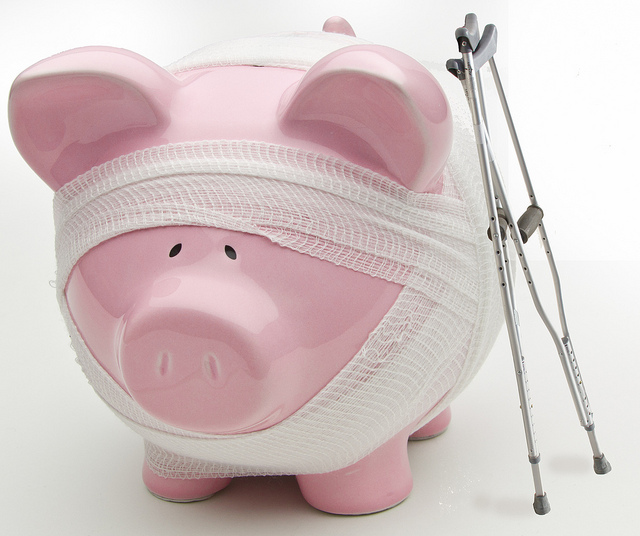Like many people who give advice about finances, I learned everything I know the hard way.
I’m not a financial expert or a student of finance. I’m an ordinary person who once got so over my head in debt that I had to learn a new way to live. I wish I could say that I was gifted with my financial knowledge from the start and always made the right decisions.
I’d love to tell you that I paid all my bills a month in advance and had six months of living expenses tucked away in the bank for emergencies. I’d love to say that I have a tidy sum sitting in a retirement account and am making efforts toward paying off a mortgage years before it’s due.
But I can’t say any of that.
Instead, I can tell you that I once looked at retail therapy as a positive way of coping with my feelings, and I lived fairly far beyond my meager means. I piled up debt and lost everything in the process of getting back on my feet.
Once the smoke had cleared, I had to learn a more mindful approach to dealing with money, and I hope these lessons can be of benefit to others.
We can become tired of living from paycheck to paycheck, frantically checking our bank balances to make sure that we don’t overdraw our accounts. But, what can we do? What realistic changes can we put into place so that we have a more positive relationship with money?
Make savings a priority. Even if we can only save five dollars, we can make it a point to save something from our paychecks.
An easy way to save is to keep all the change from cash transactions and put it in a jar or piggy bank. I never pay for anything with change. Instead, I put it in my children’s piggy banks, and at least once a year, I deposit the full amount in their savings accounts. This can be an easy way of saving a small amount at a time to add up to a larger amount later.
Save. We can learn to save for things we want rather than using credit.
Stop making purchases at convenience stores. With the exception of when we use their restroom facilities; then it is simply good manners to make a purchase to support the store. These purchases can make a huge dent in our budget and take away from our ability to pay our bills on time.
Stop purchasing water. If we invest in a water purifying system at home or portable water bottles, we will reduce plastic waste and save ourselves the cost of paying for water.
Avoid impulse purchases. This one is tough! But we need to exercise more discipline if we’re serious about getting our budgets in check.
Learn to live within our means. If we’re making regular credit card purchases outside of our income, we are officially living outside of our means. If we’re paying our bills late on a regular basis—we’re mismanaging our funds. We may need to make some adjustments, cancel our cable, or call around to find a better deal on insurance. Either way, something has to give.
Stop being permissive with ourselves about money. No, we don’t “deserve” this or that if it’s outside of our means. There’s a difference between a little treat here and there and regularly blowing our budget on little (or large) luxuries.
Re-imagine vacation. There’s this idea that we deserve a vacation every year. Yes, time off is essential, but we don’t want to borrow from tomorrow’s peace of mind by going somewhere we can’t afford today. Our vacation can be a “staycation,” which is one where we stay home but take day-trips to enjoyable destinations. Another option could be camping or having a weekend trip rather than a full week. We need to remind ourselves that an expensive vacation that we can’t afford now—and that leaves us feeling stressed later—completely takes away from the point of a vacation.
Save more than we spend. When we have “extra” money in our budget, we can learn to save more of it than we spend. This can be so tough, but I know in my life it has been essential to have emergency savings to fall back on when hard times hit. That peace of mind comes at the cost of making a sacrifice here or there to make sure that there’s something to put into that emergency fund.
Give up coffee or other small luxuries. Save that money instead. Instead of going out for ice cream as a family, we can get ice cream from the grocery store to share and put the rest of the money we would have spent in savings. Every little bit counts, and it’s more of a lifestyle change than penny-pinching.
Get comfortable with the word “used.” There’s nothing wrong with buying used clothes or other goods. We can purchase used cars or books or furniture or even learn to upcycle something old and make it new. We can stop defining ourselves by other people’s standards and learn to live comfortably within whatever means we have available.
Put your tax return away. Put your tax return into a savings account or make purchases that will help you save money down the road. Energy efficient appliances or green energy options are a great way to yield a return on our money in energy savings. We can also spend a little to grow our own vegetable gardens. We can be creative with our spending and then save as much of the rest as we can.
Prioritize our “extras” and work them into our budget. I pay for a Birchbox subscription simply because I appreciate having a little indulgence each month. It only costs ten dollars.
Other extras that may be a priority could include a gym membership to stay fit or a meal planning service that helps make things easier for families with working parents. I’m not saying we shouldn’t have luxuries, but we should use common sense to figure out which ones we can do without.
Stop lending money. I learned this one the hard way. While I was going through a divorce as a single mother of two, I made the mistake of allowing a friend to purchase my vehicle with a payment plan. Yes, I realize now that it was inadvisable. The thing is that I loved and trusted the person and believed that they would honor the commitment.
No, I really couldn’t afford to be helping anyone other than myself and my family, but if they had honored their part of the agreement, I would have been paid back before the end of the year. It would not have adversely affected me or my family at all.
A year later, and I’ve only been paid a fraction of what I was owed, and never consistently. Not only did I put my own budget at risk, I also lost this relationship by doing what I thought was a positive thing for this person. It really wasn’t. It enabled her to continue to make poor financial decisions, and it left me without quite a bit of money for my small family. It wasn’t a good decision for either of us, and I don’t know if I’ll ever see another dime.
If we’re living paycheck to paycheck, we have no business lending out our meager savings. Instead, we can provide emotional support and other resources, or we can make the money a gift—rather than a loan—to avoid future bitterness when we’re stiffed for the remaining balance.
Reward ourselves for meeting budgeting and savings goals. As a single mother of two, I live on a tight budget. I did, however, find ways to save money using the aforementioned techniques and was able to take my children on our first cruise this year. I was able to do it because I made saving the rule of the day rather than spending.
Taking a more mindful approach on spending has been life changing for me. I was able to eliminate debt, reduce waste, build a little savings, and have a healthier relationship with money.
I’m not perfect. I still have times when I overspend and break the budget. I still make the occasional impulse purchase. I do, however, make more good financial decisions than bad ones now.
I’ve been able to do this because I made it an entire lifestyle change rather than treating my finances like the latest fad diet, where I sacrifice too much—and then overspend or sacrifice too little—and never make progress.
If we can figure out a way to live well without being in debt and becoming overwhelmed, why don’t we?
After all, it’s a positive thing to have a good relationship with dollars—and sense.
~
Author: Crystal Jackson
Image: Flickr
Editor: Lieselle Davidson









Read 1 comment and reply